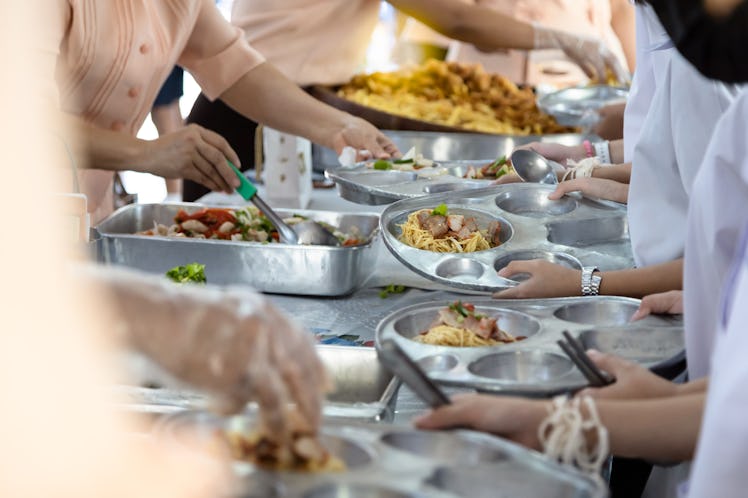A Bipartisan Free School Lunch Program Is Almost Here — If Bizarre Last-Minute Objections Let Up
A bipartisan bill to extend parts of the free school meal lunch program for kids just passed the House before a June 30th deadline. A few Senate Republicans are trying to delay it.

A group of bipartisan lawmakers successfully pushed a version of the COVID-era free school lunch program through the House. Now the new bill, the Keep Kids Fed Act, faces delay in the Senate despite being on an expedited path to passage — and a June 30th deadline.
The program that expires on June 30th expanded the federal free school lunch program and allowed kids to get free school breakfasts and lunches without needing to verify their household income passed through the House. It provided nutritious, consistent meals to 30 million kids — 10 million more than it did prior to COVID. It also increased the reimbursement rates for schools, making buying food easier during times of record inflation and supply chain issues. But with the program set to end at the end of the month, millions of kids face the threat of hunger and food insecurity.
Before it expires, lawmakers pushed to extend a version of the program with the KKFA. It has bipartisan support but does not include universal free school meals, as families will now have to prove that they’re low-income. The act passed the House with ease. Now it needs to pass the Senate — but it’s being blocked by Republicans.
The bill is being handled through an expedited process — so it only takes one Senator’s disapproval to block the expedited bill passage process, require a voice vote, and waste time when there are only seven days left of the existing program.
What Would The Program Do?
The KKFA has key changes from the current program expiring on June 30th. It would once again require parents to prove their income to apply for school lunches — which would be a step backward from the previous COVID-era program and could make it harder for families to get food. But it would still help schools cover food costs, help protect summer access to school meal programs, and ease supply chain disruptions, per the Committee on Education & Labor — which are all set to end on June 30.
The new bill would total around $3 billion and would fund meal deliveries and grab-and-go options for students, making sure that summer isn’t a time they go hungry even when they aren’t going to school every day.
Why Could The Program Get Delayed?
According to NPR, Senator Rand Paul from Kentucky is holding up the expedited bill in the Senate. Apparently, he does this frequently. His blockage of the bill delays the expedited process with just 7 days to go before the current program expires. Lawmakers still hope to get the bill on Biden’s desk before the cut-off next week.
But he’s not alone. As of June 22nd, another Republican, Senator Roger Marshall of Kansas, was “contemplating” objecting because he’s hung up on language included in new guidance documents from the U.S. Department of Agriculture (USDA), which is not a part of the expedited school lunch bill. According to Politico, the USDA nutrition guidance is incredibly narrow and only bans LGBTQ+ discrimination in programs receiving federal nutrition funds, which includes school lunch programs. That would mean that an LGBTQ+ kid can’t be denied access to food based on their sexual orientation or gender identity. It would not apply to any other issues facing LGBTQ+ kids in schools.
Politico’s reporting also suggested that Senator Mike Braun from Indiana was also considering blocking the bill.
"Time is running out. My agreement with Senator Boozman, Representative Scott, and Representative Foxx will help keep kids fed and is fully paid for," Representative Debbie Stabenow said about her school lunch bill. "With 90% of our schools still facing challenges as they return to normal operations, this will give our schools and summer meal programs much-needed support to deal with ongoing food service issues. Congress needs to act swiftly to pass this critical help."
While the blockage will just delay the bill from being voted on, it does waste precious time with just days on the line for free school lunch programs nationwide.
This article was originally published on